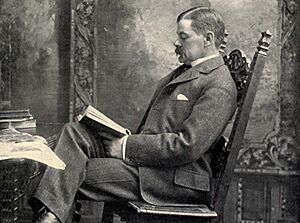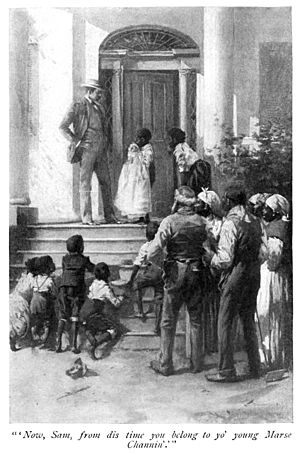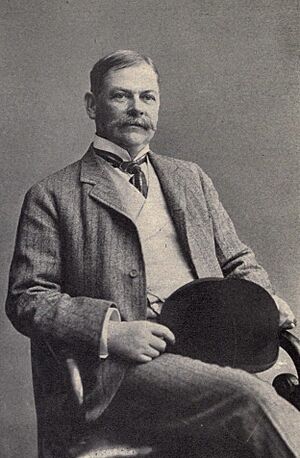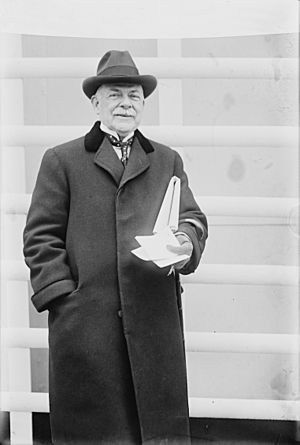Thomas Nelson Page facts for kids
Quick facts for kids
Thomas Nelson Page
|
|
|---|---|
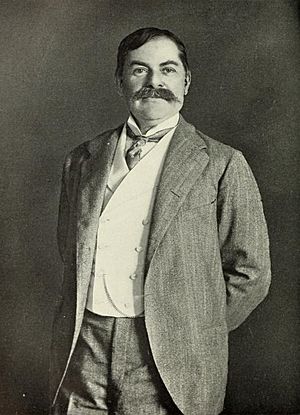
Page, photograph by Frances Benjamin Johnston
|
|
| Born | April 23, 1853 Virginia, U.S. |
| Died | November 1, 1922 (aged 69) Virginia, U.S. |
| Resting place | Rock Creek Cemetery Washington, D.C., U.S. |
| Spouse | Florence Lathrop Field |
| Relatives | Anne Elizabeth Wilson |
| Signature | |
Thomas Nelson Page (born April 23, 1853 – died November 1, 1922) was an American lawyer, a person involved in politics, and a writer. He served as the U.S. ambassador to Italy from 1913 to 1919. This was during the time President Woodrow Wilson was in charge, and it included the years of World War I.
In his books and stories, Page helped make popular a type of writing called "Plantation tradition" literature. This style of writing often presented an untrue, romanticized picture of the old South. It was used to spread the idea of the Lost Cause myth across the New South. Page first became well-known for his story "Marse Chan." This story was published in a magazine called Century Illustrated Monthly Magazine. Some of his most famous works include The Burial of the Guns and In Ole Virginia.
Contents
Early Life and Education
Thomas Nelson Page was born in Oakland, Virginia, near the village of Beaverdam. His family owned a plantation. His father, John Page, was a lawyer and also owned a plantation. His mother was Elizabeth Burwell (Nelson). Thomas came from two very important families in Virginia, the Nelson and Page families. These families were among the "First Families of Virginia."
When Thomas was 8 years old, the American Civil War began. Even though his family had been wealthy, they became very poor after the war. This happened during the time known as Reconstruction, which was when Thomas was a teenager.
In 1869, he started college at Washington College in Lexington, Virginia. This school is now called Washington and Lee University. At that time, Robert E. Lee was the president of the college. Later, in Page's writings, Robert E. Lee became a symbol of a Southern hero. Page left Washington College after three years because he didn't have enough money to finish. However, he still wanted to study law. To earn money for his law degree, he taught the children of his cousins in Kentucky. From 1873 to 1874, he studied law at the University of Virginia.
Writing and Public Service
After finishing law school, Thomas Nelson Page became a lawyer in Richmond. He worked as a lawyer from 1876 to 1893. During this time, he also started his career as a writer. By 1893, Page was not happy with the legal system in the South. He decided to stop being a lawyer completely and moved to Washington, D.C. with his wife.
In Washington, D.C., he wrote many books. By 1912, eighteen of his books had been put together and published. Page was very important in making the "Plantation tradition" style of Southern writing popular. This type of writing described an untrue, perfect version of life before the Civil War. It often showed enslaved people as happy and content, working for kind masters and their families. Page believed the South before the war was a place of pure morals. He often criticized the changes of the Gilded Age as a sign that morals were getting worse.
His 1887 collection of short stories, In Ole Virginia, is one of Page's most important works. It gives a picture of the South before the Civil War. His most famous short story from this collection was "Marse Chan." "Marse Chan" became popular because Page was good at writing how people in the South spoke. Another collection of his short stories is called The Burial of the Guns (1894). Because he was so successful as a writer, Page was well-liked among important people in Washington, D.C. He was often invited to social events with politicians from all over the country.
Under President Woodrow Wilson, Page was chosen to be the U.S. ambassador to Italy. He served in this role for six years, from 1913 to 1919. Even though he had not been trained in Italian and didn't have much experience in government, Page was determined to do a good job. He learned Italian and made good connections with Italian government officials. He also reported accurately on the situation in Italy during World War I. Page helped keep and improve the relationship between America and Italy during the war. He also supported Italy and the Triple Entente (a group of countries allied during WWI) within the U.S. government.
Page had a disagreement with President Wilson about the terms of the Treaty of Versailles. He felt Italy should receive more benefits. Because of this, he resigned from his position in 1919. His book Italy and the World War (1920) tells about his time as ambassador.
After returning to his home in Oakland, Virginia, Page continued to write for the rest of his life.
Writing Themes and Views
Thomas Nelson Page's stories written after the Civil War often showed a longing for the past South. This view was part of an idea called the Lost Cause ideology. This idea changed the true history of slavery. In his stories, enslaved people were shown as loyal, happy, and simple. They were seen as fitting perfectly into a society where masters took care of them. For example, the formerly enslaved person in "Marse Chan" is shown as uneducated and speaks in a way that sounds like a dialect. He also has strong admiration for his former master. The wealthy landowners in Page's stories were shown as noble and honorable, loyal to their country and to ideas of chivalry.
Page expressed sadness that the "good old darkies" from the slavery era had been replaced by "new issue" (Black people born after slavery). He described these new generations in very negative ways, saying they were "lazy, thriftless, intemperate, insolent, dishonest, and without the most rudimentary elements of morality." Page helped make popular the images of cheerful and devoted "Mammies" and "Sambos" in his early books. However, he also introduced very negative Black characters in his later works.
In 1898, he published Red Rock, a novel set during Reconstruction. This book included a very unpleasant and evil Black politician named Moses. Page also wrote about the difficult topic of mob violence against Black people. He often suggested that the mobs were not guilty, and instead blamed the Black victims for their own violent deaths.
Thomas Nelson Page also complained that African American leaders should stop talking about "social equality that inflames the ignorant Negro." Instead, he believed they should work to stop "the crime of ravishing and murdering women and children." These views show his deeply prejudiced and harmful beliefs about race.
Personal Life
Thomas Nelson Page married Anne Seddon Bruce on July 28, 1886. She passed away on December 21, 1888. He married again on June 6, 1893, to Florence Lathrop Field. Florence was the daughter of Jedediah Hyde Lathrop. She was also the widowed sister-in-law of a famous store owner, Marshall Field.
Page was active in helping the Association for the Preservation of Virginia Antiquities. This group worked to save historical places in Virginia, like those at Yorktown and in the Historic Triangle of Virginia. He helped get money from the government to build a seawall at Jamestown in 1900. This wall protected a site where the remains of James Fort were later found by archaeologists.
He passed away in 1922 at the age of 69 at his home in Oakland, Virginia.
See also
 In Spanish: Thomas Nelson Page para niños
In Spanish: Thomas Nelson Page para niños
- Thomas Nelson Page House, a historical building listed on the National Register of Historic Places
 | Audre Lorde |
 | John Berry Meachum |
 | Ferdinand Lee Barnett |


